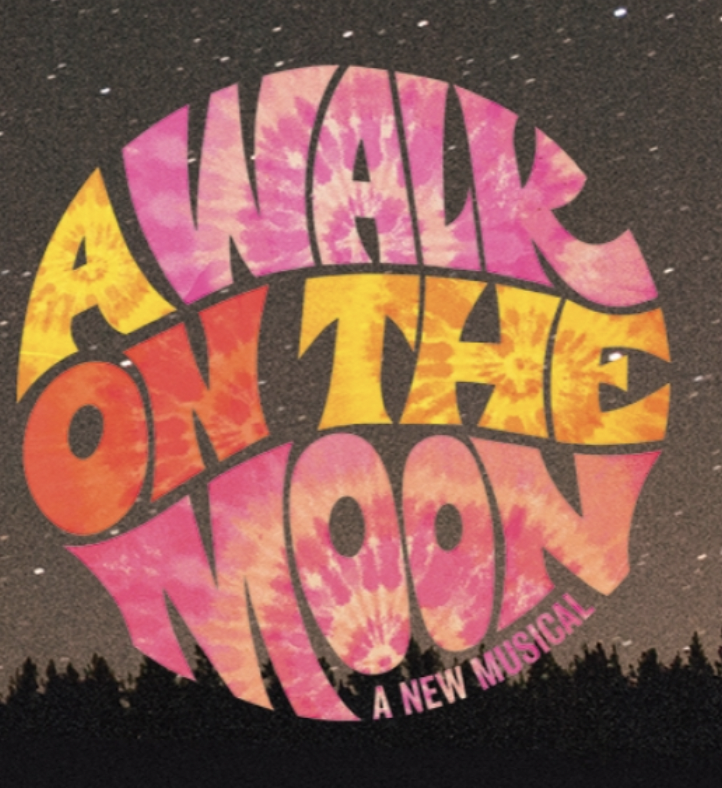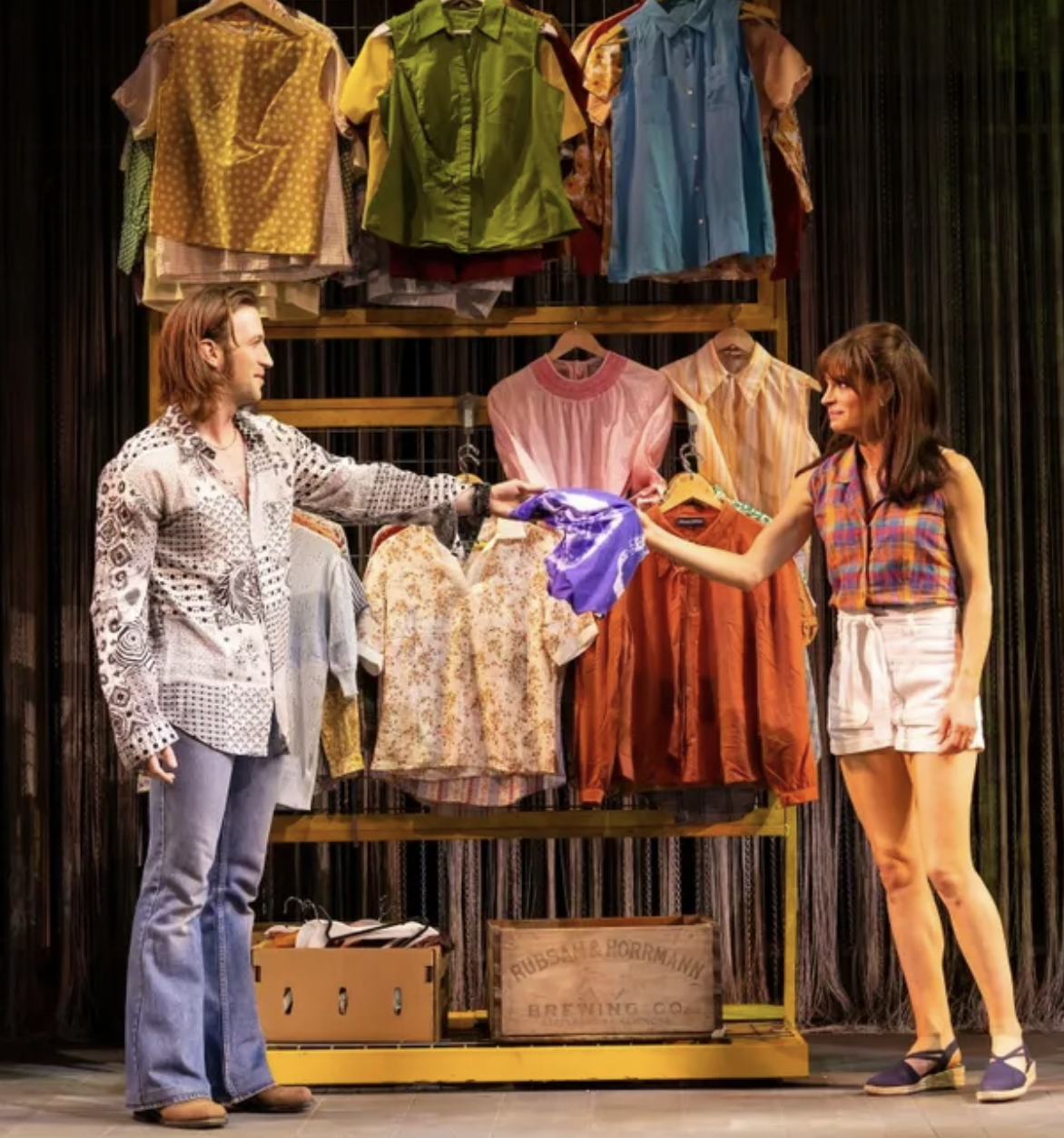The Catskills 1969 A Time of Change – Broadway Bound
By Sue Weston and Susan Rosenbluth – Two Sues on the Aisle
In the new musical, A Walk on the Moon, sugar-coated memories, framed in song, set the mood for the Kantrowitz family’s annual pilgrimage from Flatbush to Dr. Fogler’s bungalow colony in the Catskills.
Based on the award-winning 1999 Miramax film, written by Pamela Gray, the musical, by Paul Scott Goodman and AnnMarie Milazzo, with book and additional lyrics by Ms. Gray, recently enjoyed a superb staging at the George Street Playhouse in New Brunswick.
The story is pretty much the same: In 1969, when Neil Armstrong and Buzz Aldrin were preparing to be the first men to land on the moon, Pearl Kantrowitz, played in the George Street Playhouse’s production by Jackie Burns, is a still-attractive, dreamy-eyed, devoted wife, mother, and daughter-in-law, who was once an aspiring reporter but has consigned that part of her life to the dustbin of memories. She and her husband, Marty (Jonah Platt), a TV-repair man, move into a small bungalow with his mother, Lillian (Jill Abramovitz), and their two children.
The summer begins like every other, except this one is punctuated by the sense that, for movers and shakers at least, it is the end of what has been a tumultuous decade. For people like the Kantrowitzes and their bungalow friends and neighbors, not so much. “Ever feel like the whole decade’s gone by and we haven’t been in it?” Pearl asks.
Borscht Belt Catskills Loses its Innocense
Certainly, the family was not expecting the sexual revolution to find them in the Jewish mountains, but it does, first in the form of their adolescent daughter, Alison (Carly Gendell), who is determined to push the limits of her confused parents’ authority, especially with fellow bungalow-ite Ross Epstein (an adorable Wesley Zurick). Together, they emblemize the magic of the moment when the Woodstock Music Festival was being planned in Bethel, literally in the middle of the Borscht Belt Catskills yet miles from its culture and ethos that was still stuck in the 1950s.
The dark side of the sexual revolution hits the family and turns their lives upside down when Pearl, who, like all the women in the bungalow, lives husband-less throughout the week, captivates—and is captivated back—by a free-spirited blouse salesman, Walker Jerome (a sultry John Arthur Greene).
Presented as a multi-media extravaganza, the production at George Street had the look of a Broadway hit, complete with flashes and splashes of news ripped from the time-accurate headlines. The message couldn’t be clearer: when there is a drive to change, it affects everything, and those who don’t take notice of the personal, political, and radical, lasting ramifications risk getting caught in the whirlwind without knowing what has happened or why. It takes awareness and discipline to avoid what is harmful; it takes the generosity of spirit to forgive and go on.
Nostalgic 1960s
The show presents a relatable, Jewish summer experience, one that many of us (of a certain age) remember fondly and others recall from photos in the family albums. The men, who commute back to Brooklyn on Sundays and return on Fridays just before Shabbos, compare the traffic conditions they face as trophy points. At the same time, their wives gossip, play mahjong and relax until their husbands briefly return, awaiting these reunions with a mix of anticipation and obligation. Women’s rights may have been in the air (and in the news), but it has not yet found them. When Pearl tries on a tie-dyed shirt, it’s a cross between a personal statement and the hope her husband will like it, yet this act of defiance of the norms in the bungalow colony opens the door for her exploration, including a secret relationship with the discontented salesman who suggested it for her.
The play unfolds quickly, its fast-moving plot propelled forward through songs with lyrics and music steeped in rock, soul, doo-wop, and folk that exposes the characters’ unfulfilled desires, and dreams. In our personal favorites, Pearl speaks directly to Mr. Armstrong in “Out of This World,” in which she expresses her unfulfilled dreams.
Multi-Generational Perspectives
While Pearl laments her lost youth, becoming a mother too young, her mother-in-law reminds her that Marty, who seems to want nothing more than to be a hard-working, well-meaning husband and father, also sacrificed his dreams.
Using a three-generational lens, A Walk on The Moon shows the balance between youthful exuberance and family responsibility. Marty and Pearl seem to have adjusted into the conventional roles of caretaker and homemaker, providing for their children, who, like most offspring, are oblivious to their parents’ sacrifice. But Marty’s mother, Grandma Lillian, is acutely aware of her son’s and daughter-in-law’s lost potential.
These are characters whose depth-building, whose extensive backstories give A Walk on The Moon a timeless relatability. Is there anyone who never questioned the decisions made in youth? Superimposing pre-1960s middle-class Jewish lifestyles on the Woodstock movement widens the cultural-generational divide which may be the signature theme of A Walk on the Moon.
Destination Broadway
The performance at the George Street Playhouse was riveting, and the exceptionally well-casted actors brought the nostalgic story to life. Like classic Broadway shows, conversation flows seamlessly into songs, many of which include delightfully choreographed dance numbers under the supervision of choreographer, Josh Prince. There’s enough pizazz to captivate the audience, but not too much to make it dated.
While we did not walk out humming any tunes, there were many catchy numbers, that, with a little media attention, could become future classics. Sensitive viewers should be aware there is a bit of unnecessary nudity, which seemed to be included as a desperate, pointless cry for relevance. The theme and storyline take care of that without the glimpse of undressed men and women.
While both Sues feel A Walk on the Moon makes for an enjoyable adult evening out, one of us (Sue Weston) thinks this is something of a shame since, she says, “the music and storyline are family-friendly.” Susie Rosenbluth thinks kids could do without a musical that comes close to endorsing the 1960s free-sex ethic.
****
Two Sues on the Aisle bases its ratings on how many challahs it pays to buy (rather than make) in order to see the play, show, film, or exhibit being reviewed. (5 Challah is our highest rating)
“A Walk on the Moon” received a 4-challah rating.









